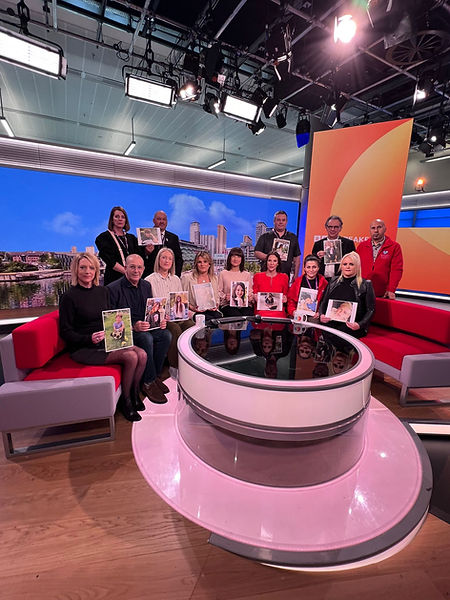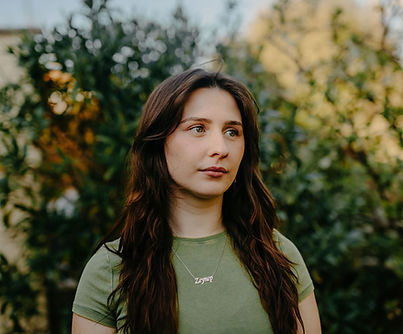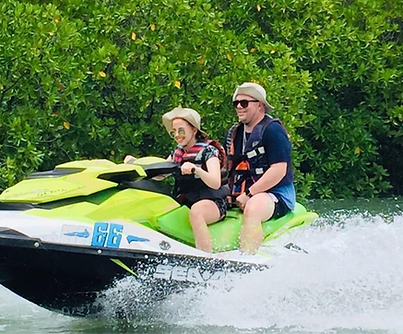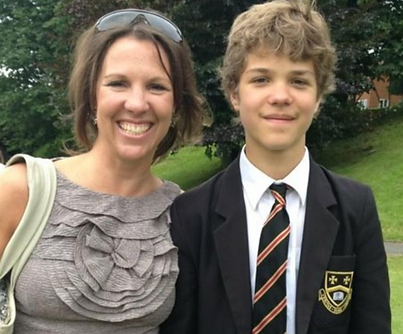Bereaved Families for Online Safety
(BFfOS)

Bereaved Families for Online Safety is a UK-based group of parents and families who have lost children/siblings to harms linked to online platforms—including suicide, grooming, blackmail, and bullying. United by tragedy, we work together to campaign for stronger online safety laws, better regulation of tech companies, and meaningful change to protect other children and families.
What we do:
💔 Support and Solidarity
-
We offer a community for bereaved families who feel isolated in their grief and share the unique pain of losing a child to online harms.
-
We provide emotional support and amplify one another’s voices to be heard by the government, media, and tech platforms.
📢 Campaign for Change
-
The group was instrumental in pushing for the Online Safety Act, sharing personal stories to help influence legislation.
-
We call for faster enforcement, stronger protections, and accountability from tech companies—especially platforms like Meta, Snapchat, TikTok, and Discord.
-
Many members also support or lead specific campaigns and you can find a link to these on the details below.
🧑⚖️ Work with Government and Regulators
-
Members regularly meet with MPs, ministers, Ofcom, and child protection experts to ensure real-world harms are not ignored in policy.
-
We help shape regulation by offering first-hand testimony on how online failures contributed to their child’s death.
🕯️ Raise Awareness
-
Through public speaking, media interviews, school visits, and social media campaigns, we aim to educate parents, young people, and professionals about the real risks children face online—from algorithms that promote harmful content to unmoderated chatrooms and online predators.
In short, Bereaved Families for Online Safety exists because too many lives have been lost, and because silence does not help anyone. We are fighting, not just in memory of our children/siblings, but to prevent the same thing from happening to yours.

Meet the members
(in first name alphabetical order)

Aimee Elif Walton
Adele has channelled a personal loss into campaigning and advocating for a safer digital world. In 2022, Adele lost her sister Aimee when she was 21 to an online forum that promotes, encourages and assists suicide. The poison Aimee was able to acquire was supplied by criminal Kenneth Law, who is responsible for at least 99 UK deaths. The forum was founded by 2 self-identified incels, who also founded the world’s largest incel forum.
Since then, she has dedicated her work as a journalist to shine a light on online harms and the lack of tech accountability which harms young people. Her debut non-fiction book Logging Off: The Human Cost of Our Digital World published in 2025. She is also co-founder of Logging Off Club, a community that hosts phone-free events across the UK, to encourage offline connection.

Alice Hendy
Josh Hendy
In November 2020, my life changed forever when I lost my younger brother, Josh, to suicide. He was just 21 years old. After his death, I gained access to his laptop and discovered that he had been researching ways to take his own life online. What I saw broke my heart—and made me realise that the internet had offered him no support, no intervention, and no message of hope.
With a background in cybersecurity and risk, I knew I had to do something to change that. So, I created R;pple Suicide Prevention—a browser extension designed to intercept harmful online searches and instead offer users support, encouragement, and immediate access to mental health resources.
R;pple is a digital safety net that appears when someone searches for content related to suicide or self-harm. It disrupts that moment, reminds them that they are not alone, and guides them toward help. Since launching in 2021, R;pple has been installed on hundreds of thousands of devices across schools, workplaces, police forces, and homes, and has already helped to save many lives.
I now dedicate my time to raising awareness of suicide prevention, advocating for online safety, and supporting others who are facing their darkest moments. My mission is simple: to make sure that anyone in crisis is met not with silence, but with hope.

Ellen Roome
Jools Sweeney, Forever 14
I am fighting for transparency and safety in the digital space so no other family has to endure the pain we have suffered.
My life changed forever on April 13, 2022, when my son, Jools Sweeney, took his own life. His sudden death left me searching for answers. Nothing was found offline to explain why he might have taken the actions he did. The Coroner said that he couldn’t be certain Jools was in a suicidal mood, and so it’s a narrative description on his death certificate of how he died.
I was left with no answers as to why, and since Jools’ social media data was not fully examined during his inquest, I approached the companies directly for answers—none of them would allow me access to his browsing data and messages.
Jools’ social media accounts could provide vital insights into his actions and whether an online challenge or other harmful interactions influenced him. Without access, I am left in the dark—like so many other bereaved parents—unable to understand what happened to my precious son.
This is why I campaign for Jools’ Law: to ensure that parents, in the wake of tragedy, have the legal right to request access to their child’s digital data. We deserve answers. We deserve the truth. And more importantly, we deserve the chance to prevent this from happening to another child.

Esther Ghey
Brianna Ghey
My daughter, Brianna Ghey, was murdered on the 11th of February 2023. She was lured to a park by two fifteen-year-olds and stabbed 28 times. The children who killed her had been consuming violent and extreme content online. One of them was watching torture videos and so-called “red room” material on the dark web. Part of their motive was to act out the disturbing things they had seen online.
In the months before her death, Brianna was struggling deeply with her mental health. She was self-harming, battling anorexia, and becoming increasingly isolated from those who loved her. I worried about how much time she was spending on her phone and who she was speaking to online, but it wasn’t until after she died that I discovered she had been accessing harmful content that encouraged self-harm and disordered eating. I still don’t know the full extent of what she saw.
Her phone had become an addiction. She was constantly scrolling, often late into the night, and trying to take it away led to constant conflict. I could see it was hurting her, but I didn’t know how to help, and neither did the professionals we turned to.
It is my mission to prevent young people and families from suffering the way we did. I carry Brianna in my heart every single day, she is the driving force behind everything I do.

George & Areti Nicolaou
Christoforos Nicolaou
Our son Christoforos was bright, kind, and full of promise. He loved cooking, football, and was top of his class in maths and science. He was always curious, always thoughtful—a truly wonderful boy.
In early 2022, while gaming, he clicked on a pop-up offering free credits. That small moment led him into an online forum where predators began blackmailing him. Over just 50 days, they manipulated him with terrifying threats, forcing him to complete degrading tasks and convincing him our family would be harmed if he didn’t obey.
He became quiet and withdrawn, but when we asked, he said he was fine. We had no idea what was really happening until after he died.
On 6 March 2022, Christoforos ended his life. He was 15.
Only after his death did we discover the messages—the coercion, the psychological abuse. We were devastated.
We’ve established the Christoforos Charity Foundation to raise awareness, support families, and help protect children from hidden online dangers. We want no other parent to go through what we have.
We miss him every moment. This is our way of honouring him.

Hollie Dance
Archie Battersbee forever 12.
I’m Hollie Dance, and I’m the Mum of Archie Battersbee.
In April 2022, our lives changed forever when I found Archie unconscious at home. I believe he participated in a dangerous online challenge that no child should ever have been exposed to. From that moment on, our family was thrown into a devastating and deeply complex journey—one that would eventually lead to a four-month legal battle to keep Archie’s life support from being withdrawn.
Throughout that time, I fought not just for Archie’s life, but for the right of every parent to be heard and respected when making medical decisions about their child. No parent should ever be sidelined or made to feel powerless in such critical moments.
Since losing Archie, I’ve made it my mission to raise awareness in schools and communities about the hidden dangers of harmful online content. Children are being targeted by viral challenges, harmful algorithms, and unsafe platforms, often without any protections or warnings in place. I speak out so that what happened to Archie doesn’t happen to another child.
I now also campaign for stronger legal protections for parental rights—particularly in life support cases—so that families are not left feeling voiceless in the face of unimaginable decisions.

Maia Walsh - forever 13
Maia was 13 and teetering on the brink of her 14th birthday when she died in October 2022 at her mother’s home. She was intelligent, funny, kind, an avid chess player—and into everything life had to offer. In an instant, she was gone.
I believe that before her death, Maia was influenced by chilling and harmful content on TikTok. Her online activity—including two disturbing self‑harm videos she had liked—was discovered later when we gained access to her device. It broke my heart and sparked my determination.
Since then, I’ve campaigned tirelessly for transparency and accountability. I want coroners and investigators to be able to request access to children’s social media and watch histories, so families like ours can seek the truth. TikTok and other platforms claim to prohibit self‑harm content—but if Maia’s experience proves anything, it’s that policies on paper may not stop algorithm‑fed harm in practice.

Lisa Kenevan
Isaac Kenevan
I’m Lisa Kenevan, mum to Isaac, who we heartbreakingly lost in March 2022 when he was just 13 years old. We believe his death was the result of a dangerous online challenge—something no parent ever expects their child to encounter.
In 2024, I joined forces with Hollie Dance to launch the Be Challenge Aware campaign. Our mission is to raise awareness of the hidden dangers children face online—challenges, trends, and content that can have devastating consequences.
We now visit schools, speak with parents, and collaborate with Bereaved Families for Online Safety (BFfOS) to advocate for meaningful change in how tech platforms protect young people.
This is our way of turning pain into purpose—and protecting other families from the unthinkable.

Lorin LaFave
Breck Bednar
I’m Lorin LaFave, mother to Breck Bednar, who was tragically murdered at the age of 14. Breck was a bright, kind, and talented boy who loved gaming. While playing online with friends from school, he was groomed over a long period by a predator pretending to be someone he could trust. In 2014, Breck was lured from our home and killed.
Since losing my son, I have dedicated my life to raising awareness about online grooming and exploitation. Through the Breck Foundation, I work to educate young people, parents, and schools about how grooming can happen—even when children are seemingly safe, surrounded by friends, or in their own bedrooms.
My mission is to ensure no other family experiences the preventable heartbreak we did. By promoting safe and responsible use of technology, I hope Breck’s story will empower others to stay alert, speak up, and stay safe.

Mariano Janin
Mia Janin
My daughter Mia was 14 years old when she took her own life in March 2021 after months of relentless bullying at school and online. She was bright, funny, creative, and full of dreams for the future. Despite raising concerns, the systems meant to protect her failed.
Since her death, I’ve been campaigning for stronger protections for children—both in schools and online—and for bereaved parents to have access to their child’s digital data. Mia’s voice was silenced, but through our work, I hope it will help protect others.
.jpg)
Ruth Moss
Sophie Parkinson, forever 13 years old
I’m Ruth Moss and am Mum to Sophie who died by suicide in 2014. She was just 13 years old.
Prior to Sophie’s death, we had struggled to control her internet use, having given her a mobile phone the year before her death. Sophie became quickly addicted to her phone and although we had protected our internet at home, she would continue to use her phone outside the home to access damaging and ultimately fatal material online.
The conversations we had about safe internet use made little difference and it became a battle to limit screen time (which we did anyway). Checking Sophie’s internet history was a fight. When I did manage to examine her history, the material she had viewed was horrifying. Sophie had created a fake persona on several sites, claiming to be older than she was and was communicating with adults in their 20s and 30s, in completely age-inappropriate ways. She had been accessing violent suicide promoting websites. Suddenly, the reasons for Sophie’s worsening mood became clear. This was not just ‘puberty’ or fluctuating teenage behaviour. Although Sophie had suffered from low self-esteem before, her mental health nose-dived. The police and professionals were powerless to help.
In 2014, no-one really talked about internet use and at that time, if children got into difficulty online, parent blaming/shaming was the first thought in many people’s mind. But many charities were starting to call for online regulation. They focussed on the accountability of big tech to make their products safe to use. So, I started to speak out.
After Sophie’s death, I campaigned for an Online Safety Act, which whilst it came in in 2023, is far from perfect. Technology moves quicker than legislation and the work that is still required to make the internet safe for children is bigger than ever. Added to this environment is the ‘profit over people’ attitude of many multi-trillion-dollar tech companies. And so, the fight to make the internet a safer place continues. I still work with charities, BFOS and the media. Together, we work hard to make sure that the unthinkable loss of a child from online harm can be prevented from happening to other families.

Olly Stephens
We are Stuart and Amanda Stephens, the bereaved parents of Olly Stephens, who was just 13 when he was set up, lured out by a girl to open parkland near our home, and stabbed to death by children aged 13 and 14, on the afternoon of Sunday 3rd January 2021.
In the year that led up to Olly's murder, he had poorly transitioned into secondary school, he was diagnosed with autism spectrum, he had been pulled into a gang and criminally exploited, and he had low self-esteem. He struggled with his mental health, and he became excluded from school.
Olly was addicted to his smartphone from the moment he was given one, as he wanted to walk himself to school with a friend in the final year of primary. From that point on, we lost our son. Olly had been a fun-loving, caring boy who had many hobbies and interests. It came in gradually, but in the end, his phone was never out of his hand. Olly had no break from the online world; it became his world 24/7.
We knew that the answers to why this had happened to Olly would be on his phone; in the end, the answers were found across 11 different platforms, from 41 devices seized and 1,980 voice notes, all compiled by Thames Valley Police in Operation Iodine. We will never know what the children deleted or what Olly was viewing; there will always be questions.
We began to understand, over time and with help and support, that the online world our young people are living in is unsafe, and we had to do something about it. It has become our "Olly's Work" and gives us a focus and purpose through our grief. We work locally and nationally. For more information, please visit this link.